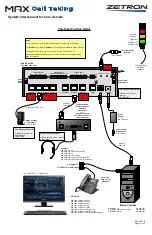
CAP.1.
DESCRIZIONE DELLA
MACCHINA
I ponti sollevatori a 4 colonne sono fissi, cioè ancorati al suolo;
sono progettati e costruiti per il sollevamento e lo stazionamento in
quota di autoveicoli e furgoni.
Sono composti principalmente da una parte fissa, ancorata al ter-
reno (colonne) e da una parte mobile (traverse e pedane di soste-
gno e sollevamento).
Il funzionamento è di tipo elettroidraulico.
Questi sollevatori sono composti, fondamentalmente da quattro
parti:
- gruppo struttura fissa;
- gruppo struttura mobile;
- gruppo di sollevamento;
- sicurezze.
In figura 3 sono indicate le varie parti che compongono il sollevato-
re e le zone di lavoro attorno al sollevatore stesso.
Lato operatore: è il lato anteriore del sollevatore, quello che com-
prende anche la zona riservata all’operatore in cui si accede al
quadro comandi ed è opposta al lato di ingresso del sollevatore.
Lato posteriore: è il lato opposto a quello operatore in cui si trova-
no le rampe di accesso al sollevatore.
Lati destro e sinistro: sono stabiliti rispetto all’operatore rivolto ver-
so il sollevatore.
Zona di rischio: è la zona di rischio in cui non si deve mai sostare
quando il sollevatore è in funzione; spiegazioni maggiormente det-
tagliate le troverete nel capitolo 3 “Sicurezze”.
La numerazione in figura 3 si riferisce a:
1
colonna lato comando (si intende per
convenzione interna come anteriore destra)
2
colonna anteriore sinistra
3
colonna posteriore sinistra
4
colonna posteriore destra
5
traversa lato comando (traversa anteriore)
6
traversa traversa posteriore
7
pedana destra, fissa
8
pedana sinistra, mobile
Figura 3
Figure 3
CHAPTER 1.
DESCRIPTION
OF THE MACHINE
Four-post lifts are fixed installations, i.e. anchored to the floor; the
units are designed and built for lifting cars and vans and holding
them in an elevated position.
The units are essentially made up of a fixed part that is anchored
to the floor (posts) and a moving part (cross-pieces and platforms).
The operation is electro-hydraulic
There are four basic parts of the lifts:
- fixed structure assembly;
- movable structure assembly;
- lifting assembly;
- safety devices.
Figure 3 shows the various parts of the lift and the operating zones
in the surrounding area.
Operator side: this is the front of the lift, including the area reser-
ved for the operator with the control panel. The operator side is op-
posite the vehicle access side.
Rear side: it is the side opposed the operator’s one, with the lift ac-
cess ramps.
Right and left sides: the right and left is considered from the opera-
tor’s standpoint when facing the lift.
Danger zone: an area that must be kept clear of persons when the
lift is in use; refer to “Safety devices” chapter 3 for details.
Key to figure 3:
1
control side post (conventionally the front right-hand post)
2
front left post
3
rear left post
4
rear right post
5
control side cross-piece (front cross-piece)
6
rear cross-piece
7
right fixed platform
8
left moving platform
6
1
5
7
8
4
3
6
2
Zona operatore
Operator zone
Содержание 442 LP
Страница 1: ...I PONTE SOLLEVATORE A 4 COLONNE GB 4 POST LIFT 442 LP...
Страница 2: ......
Страница 13: ...SCHEMI ELETTRICI ED OLEODINAMICI WIRING DIAGRAMS AND HYDRAULIC 11...
Страница 28: ...Fig 42 Fig 42 26 A B C K X K X Fune K Colonne 1 3 Fune X Colonne 2 4 Cable K Post 1 3 Cable X Post 2 4...
Страница 42: ...COLONNE POSTS S ULEN COLONNES COLUMNAS...
Страница 43: ...TRAVERSE CROSSBEAMS TRAVERSE TRAVERSES TRAVERSA OS...
Страница 44: ...PEDANE PLATFORMS FAHRSCHIENE CHEMINS DE ROULEMENT PLATAFORMAS...
Страница 45: ...CILINDRO CYLINDER ZYLINDER V RIN CILINDRO...
Страница 47: ...QUADRO ELETTRICO TRIFASE CONTROL PANEL SCHALTTAFEL DREHSTROM COFFRET LECTRIQUE CUADRO ELECTRICO...
Страница 54: ......









































